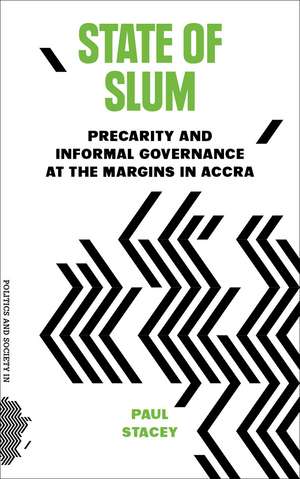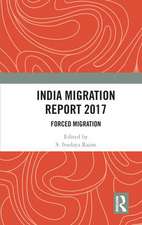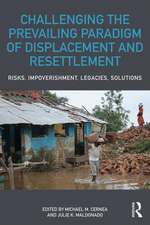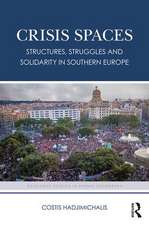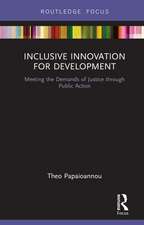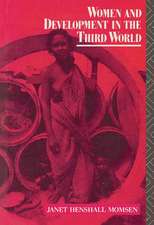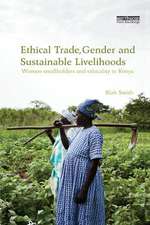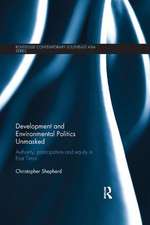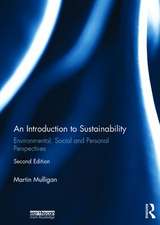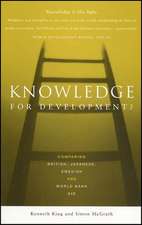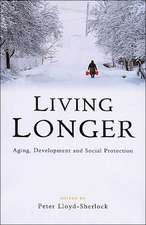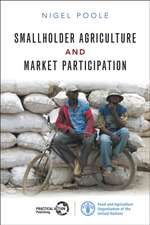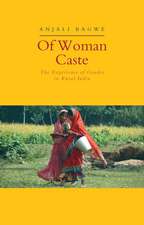State of Slum: Precarity and Informal Governance at the Margins in Accra: Politics and Society in Urban Africa
Autor Paul Staceyen Limba Engleză Hardback – 14 apr 2019
Home to eighty thousand people, Accra’s Old Fadama neighborhood is the largest illegal slum in Ghana. Though almost all its inhabitants are Ghanaian born, their status as illegal “squatters” means that they live a precarious existence, marginalized within Ghanaian society and denied many of the rights to which they are entitled as citizens.
The case of Old Fadama is far from unique. Across Africa, more than half the population now lives in cities, and a lack of affordable housing means that growing numbers live in similar illegal slum communities, often in appalling conditions. Drawing on rich, ethnographic fieldwork, the book takes as its point of departure the narratives that emerge from the everyday lives and struggles of these people, using the perspective offered by Old Fadama as a means of identifying wider trends and dynamics across African slums.
Central to Stacey’s argument is the idea that such slums possess their own structures of governance, grounded in processes of negotiation between slum residents and external actors. In the process, Stacey transforms our understanding not only of slums, but of governance itself, moving us beyond prevailing state-centric approaches to consider how even a society’s most marginal members can play a key role in shaping and contesting state power.
The case of Old Fadama is far from unique. Across Africa, more than half the population now lives in cities, and a lack of affordable housing means that growing numbers live in similar illegal slum communities, often in appalling conditions. Drawing on rich, ethnographic fieldwork, the book takes as its point of departure the narratives that emerge from the everyday lives and struggles of these people, using the perspective offered by Old Fadama as a means of identifying wider trends and dynamics across African slums.
Central to Stacey’s argument is the idea that such slums possess their own structures of governance, grounded in processes of negotiation between slum residents and external actors. In the process, Stacey transforms our understanding not only of slums, but of governance itself, moving us beyond prevailing state-centric approaches to consider how even a society’s most marginal members can play a key role in shaping and contesting state power.
| Toate formatele și edițiile | Preț | Express |
|---|---|---|
| Paperback (1) | 216.26 lei 6-8 săpt. | |
| Bloomsbury Publishing – 20 oct 2021 | 216.26 lei 6-8 săpt. | |
| Hardback (1) | 494.94 lei 6-8 săpt. | +84.70 lei 10-14 zile |
| ZED BOOKS – 14 apr 2019 | 494.94 lei 6-8 săpt. | +84.70 lei 10-14 zile |
Preț: 494.94 lei
Preț vechi: 611.73 lei
-19% Nou
Puncte Express: 742
Preț estimativ în valută:
94.70€ • 99.15$ • 78.36£
94.70€ • 99.15$ • 78.36£
Carte tipărită la comandă
Livrare economică 05-19 aprilie
Livrare express 04-08 martie pentru 94.69 lei
Preluare comenzi: 021 569.72.76
Specificații
ISBN-13: 9781786992048
ISBN-10: 1786992043
Pagini: 288
Ilustrații: 1 bw map, 9 bw illus
Dimensiuni: 140 x 222 x 25 mm
Greutate: 0.34 kg
Editura: ZED BOOKS
Colecția Zed Books
Seria Politics and Society in Urban Africa
Locul publicării:London, United Kingdom
ISBN-10: 1786992043
Pagini: 288
Ilustrații: 1 bw map, 9 bw illus
Dimensiuni: 140 x 222 x 25 mm
Greutate: 0.34 kg
Editura: ZED BOOKS
Colecția Zed Books
Seria Politics and Society in Urban Africa
Locul publicării:London, United Kingdom
Caracteristici
Slums are a hot topic across the social sciences, fuelled by the rapid growth of urbanisation around the world.
Notă biografică
Paul Stacey is a postdoctoral researcher in global development at the Institute for Food and Resource Economics, University of Copenhagen. He has undertaken research projects for Oxfam America, the Danish Institute for International Studies, and the Bill and Melinda Gates Foundation. This is his first book.
Cuprins
Introduction 1. Origins and Destinations 2. Seeking Shelter and Freedom 3. Gaining and Losing Land, and Soft Property 4. Shifting Yam, and Market Place Citizenship 5. Solving Problems and Emerging Authority Conclusions and Policy Perspectives
